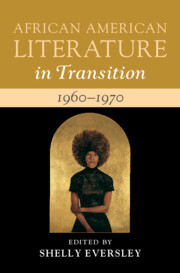Book contents
- African American Literature in Transition, 1960–1970
- African American Literature In Transition
- African American Literature in Transition, 1960–1970
- Copyright page
- Contents
- Contributors
- Preface
- Acknowledgments
- Chronology
- Introduction
- I Poetry and Music
- II Culture and Politics
- Chapter 5 The Rights of Black Love
- Chapter 6 Albert Murray Beyond Plight and Blight
- Chapter 7 Espionage and Paths of Black Radicalism
- Chapter 8 The Necessary Violence of Frantz Fanon and Malcolm X in Global Black Revolution
- III Beyond the Canon
- Index
- References
Chapter 6 - Albert Murray Beyond Plight and Blight
from II - Culture and Politics
Published online by Cambridge University Press: 10 November 2022
- African American Literature in Transition, 1960–1970
- African American Literature In Transition
- African American Literature in Transition, 1960–1970
- Copyright page
- Contents
- Contributors
- Preface
- Acknowledgments
- Chronology
- Introduction
- I Poetry and Music
- II Culture and Politics
- Chapter 5 The Rights of Black Love
- Chapter 6 Albert Murray Beyond Plight and Blight
- Chapter 7 Espionage and Paths of Black Radicalism
- Chapter 8 The Necessary Violence of Frantz Fanon and Malcolm X in Global Black Revolution
- III Beyond the Canon
- Index
- References
Summary
This chapter explores Albert Murray’s diagnosis and refusal of key elements of 1960s-style Black cultural politics. In books like The Omni-Americans he repudiated the pessimism and particularism that he found in figures like Baldwin and replaced it with a life-affirming concrete universalism rooted in the blues as a mode of phenomenology and in the sense that a fully American Blackness could stand as an instance and emblem of universal human experience. The chapter provides a brief sketch of Murray’s life; discusses the intellectual commitments he shared with his most important interlocutor, Ralph Ellison; explains how Murray turned these shared commitments into his own distinctive philosophical apparatus; and explores what may be the clearest difference between Murray and Ellison: Murray’s willingness to cultivate followers like Henry Louis Gates, Jr., and Wynton Marsalis, pivotal culture workers in the post-civil rights shift in U.S. racial politics.
Keywords
- Type
- Chapter
- Information
- African American Literature in Transition, 1960–1970Black Art, Politics, and Aesthetics, pp. 146 - 172Publisher: Cambridge University PressPrint publication year: 2022

